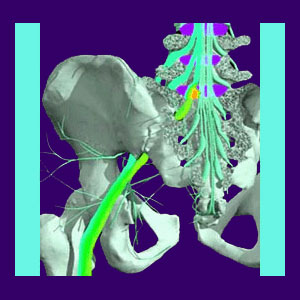
Chronic sciatica symptoms are an all too common problem for many patients who are diagnosed with some variety of lower lumbar radiculopathy nerve pain. Sciatica is a symptomatic expression of some causative condition or process. It is not a condition unto itself. Sciatic nerve pain is one of the most frequent symptoms associated with a wide variety of lower back pain syndromes. Sciatica has a foul and well deserved reputation as a long lasting problematic symptom set which typically defies all attempts at treatment.
I can tell you from personal experience that sciatica is perhaps the most variable and structurally illogical pain condition I have ever come across. As a longtime sufferer myself, my lower body symptoms range wildly from day to day. Sometimes they are terrible, while other times they are barely present. They move around and change expressions frequently, making a purely structural cause seem virtually impossible in my case. Your stories also support these findings and add a depth of complication to sciatica which often puzzles patients and their care providers.
Chronic Sciatica Symptoms
Sciatica is typically described as pain, tingling, numbness or weakness, alone or in combination, in the lower back, buttocks, legs or feet. Patients can experience one or more symptoms in any or all of these anatomical locations. Some patients have a regular pain pattern with symptoms remaining consistent in type and location. Other patients have a variable pattern which moves around haphazardly throughout the lower body area.
Many patients have pain as their primary complaint, while others suffer from an accompanying variety of neurological symptoms which create limited mobility and functionality in the lower limbs. To further complicate matters, neurological expressions, such as weakness and numbness, can be subjective or objective, adding confusion to the mix.
Chronic Sciatica Causes
Some cases of sciatic nerve symptoms are the direct result of an anatomical defect or injury in the spine:
Pinched lumbar nerve roots can affect the sciatic nerve anywhere in the lower body.
Herniated discs are the most common cause of this condition, although this type of pain is rarely a long-term concern.
Spinal stenosis can also cause neurological effects, as can advanced cases of facet joint syndrome and other forms of spinal osteoarthritis.
Most of these degenerative syndromes do not cause chronic pain, even though they are commonly blamed as the actual cause of symptoms. Remember, they are normal to experience as we age and most people with the physical signs of the conditions do not suffer symptoms.
All of these conditions are popular back pain scapegoats and may be blamed unfairly for creating suffering when all along they are not doing any harm whatsoever. In some of these cases, the scapegoats are purposefully utilized to justify profitable treatment by money-hungry doctors and therapists.
One of the most prevalent reasons for chronic sciatic nerve involvement is oxygen deprivation caused by a psychological back pain syndrome. Mindbody conditions account for a great number of chronic pain syndromes of all types and anatomical locations. These conditions are rarely correctly diagnosed, which accounts for their ability to defy traditional medical treatments.
Many mindbody professionals call the sciatic nerve a barometer of emotional activity. It seems to be one of those anatomical locations, much like the stomach or neck, which suffers greatly when we are stressed consciously, or worse still, affected by repressed subconscious psychological issues.
Sciatica as a Chronic Suffering
I suffered with severe chronic sciatica for 18 years as part of my own original back pain ordeal. The pain was blamed on my lumbar degenerative disc disease and 2 herniated discs in my lower back. I tried everything to cure this torturous condition, but nothing seemed to help. It took me a long time to find out the truth of why my pain continued for so long. In the end, I realized that the anatomical abnormalities in my spine had little to do with my pain and symptoms.
My pain turned out to be a mindbody syndrome, at least in part, just like many other patients. I never would have believed that such misery could be caused by an emotional condition, but curing my pain using knowledge therapy made me a believer. I am so happy I opened my mind enough to discover the truth. It was my savior.
In closing, it is crucial to remember that the mind and body work hand in hand in determining all matters of health and disease. Never forget this basic truth and use it to find your own cure. I promise you that the answer is out there. You just have to find how it applies to you and your pain.





